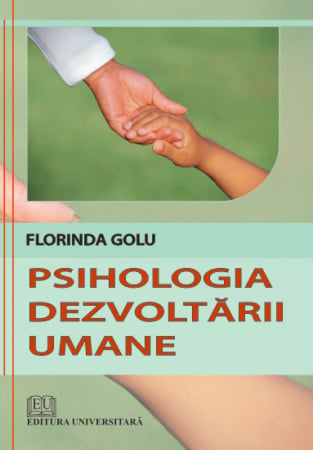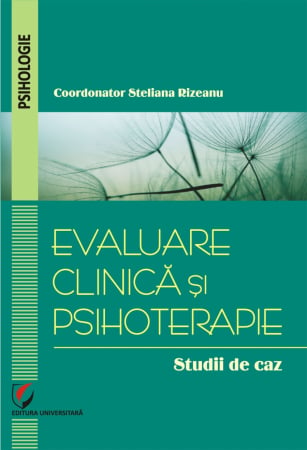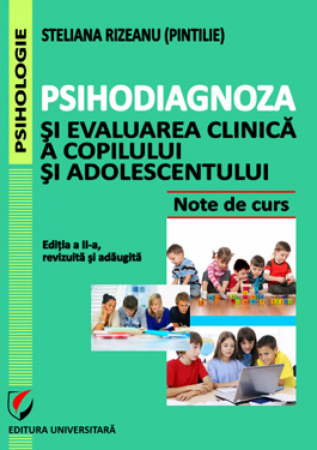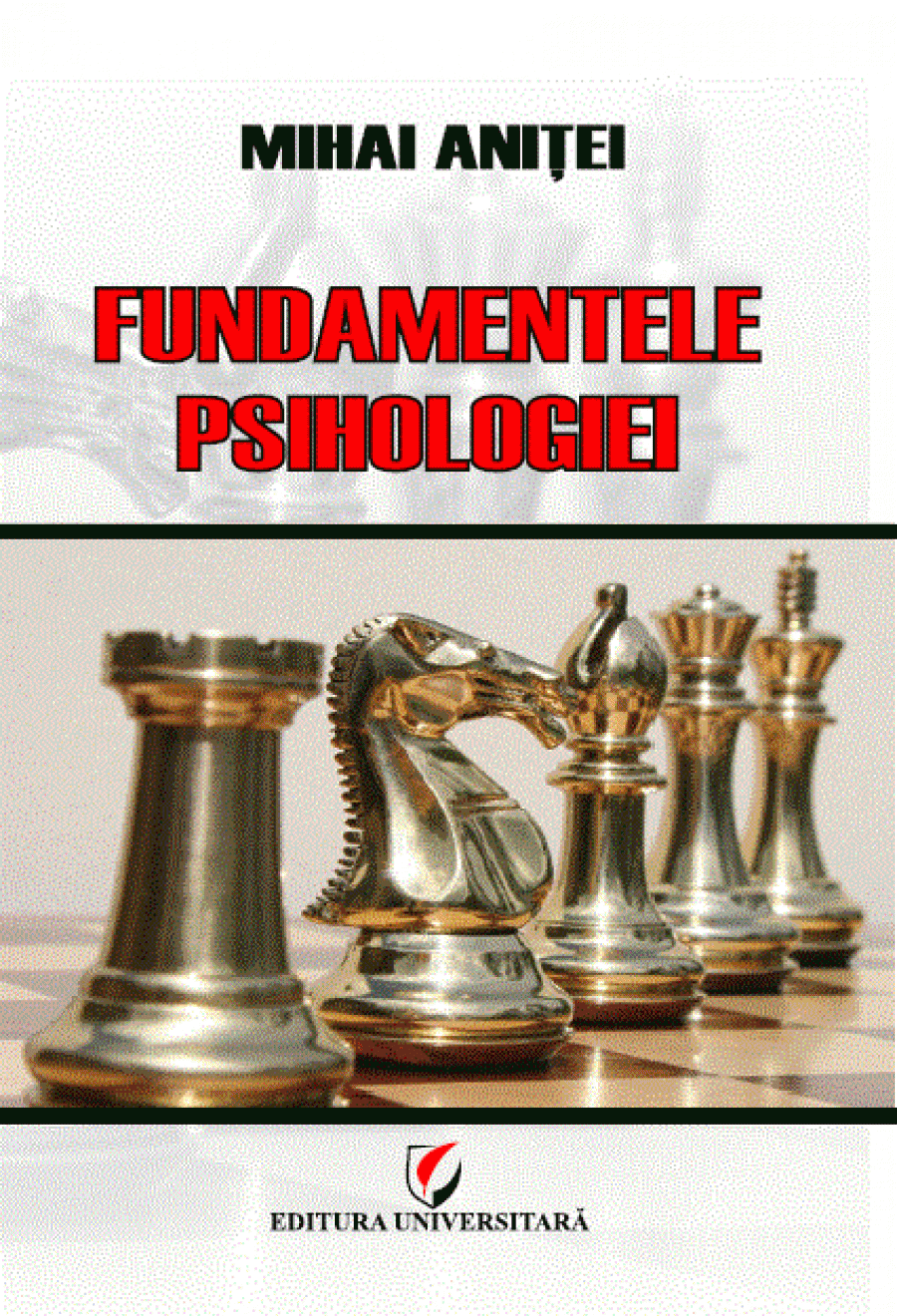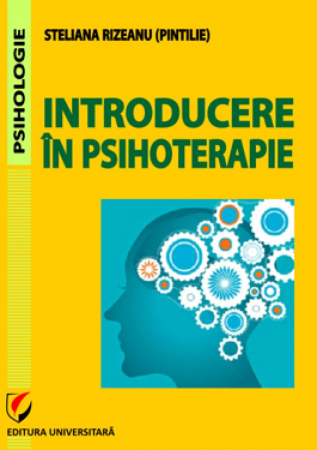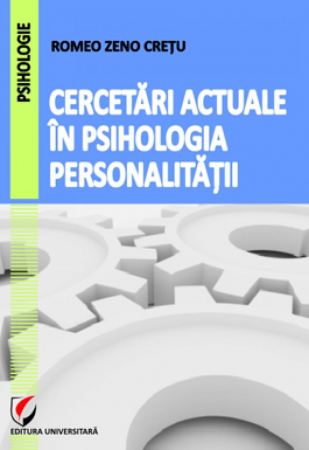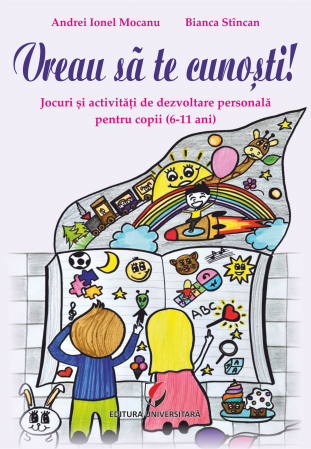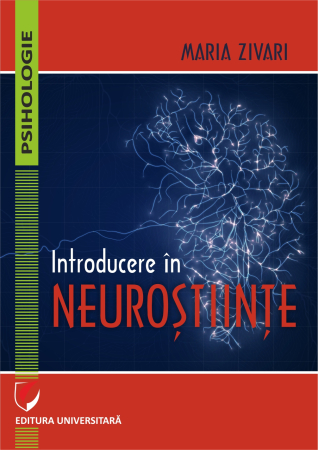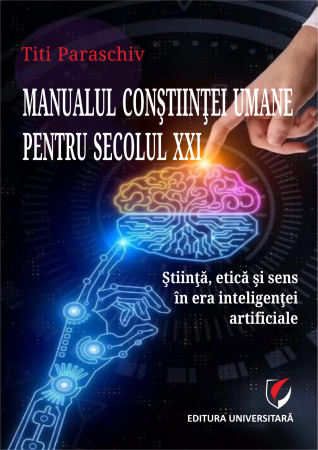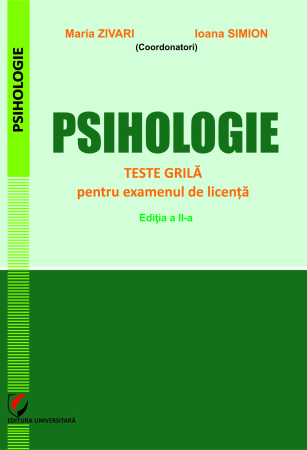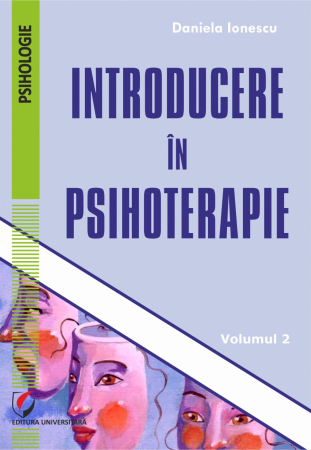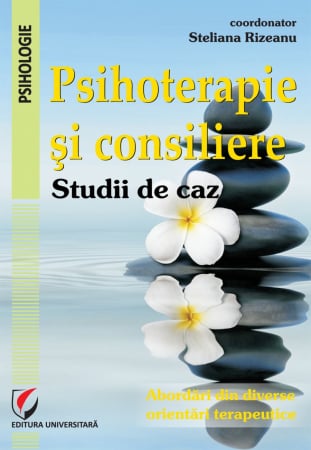6359.png) Sex, Alcohol, Marijuana and Depression among Young People in Romania. National Study with the Participation of over 10,000 Young People and 1,200 Parents
Sex, Alcohol, Marijuana and Depression among Young People in Romania. National Study with the Participation of over 10,000 Young People and 1,200 Parents
6359.png)
ISBN: 978-606-28-1157-0
DOI: https://doi.org/10.5682/9786062811570
Publisher year: 2020
Edition: I
Pages: 322
Publisher: Editura Universitară
Author: Mihai Copaceanu
- Description
- Download (1)
- Authors
- More details
- Content
- Reviews (0)
This book presents for the first time the results of an extensive doctoral research, Health and substance use among young people in Romania, conducted over a period of four years (2015-2019) under the coordination of Professor Constantin Balaceanu-Stolnici at the Institute of Anthropology "Francisc Rainer" of the Romanian Academy, research publicly supported on September 4, 2019. To my knowledge it is the largest research ever conducted in Romania that analyzes issues related to substance use among young people. In fact, I think it is the only doctoral research, at least in the field of socio-medical sciences, which included over 10,000 participants.
You will notice that a theoretical part of the research is not included, because the historical, anthropological, cultural and medical analyzes along with the psychological and psychotherapeutic aspects of substance use were previously published in the volume Drugs, a mandatory book (Ed. Eikon, Bucharest, 2018), a book of great interest especially for parents and teenagers. If both sides had been contained in a single volume, it would have meant a far too extensive work. Practically speaking, the doctoral thesis included 7 theoretical chapters. The first chapter included the motivation and purpose of the work, drugs in human history, the carved stone age-Paleolithic, the Old Testament, Egypt-the study of mummies, China, Africa and Europe. The second chapter analyzed the anthropological perspective of drugs with specificity on shamanism, with clarifications of the researches of Mircea Eliade and Ioan Petre Culianu and with comments on the anthropology of tobacco and alcohol consumption. The third chapter referred to the cultural aspects of drug use, including culturally explanatory theories, drugs, healers, shamans, drugs and music, religion, sexuality, drugs in Romanian culture and a new culture of drugs, online culture. The fourth shorter chapter includes an analysis of economic aspects, drug trafficking, crime, figures on drug use in Europe and Romania, European and national studies. The fifth chapter includes the medical aspects of substance use, the diagnosis of addiction, the neuropsychology and neurobiology of addiction, the physical and mental effects of substance use. The sixth chapter presented the treatment of addiction, psychotherapeutic interventions, cognitive behavioral psychotherapy, group therapy, family therapy and marital counseling and spiritual recovery.
The seventh chapter deals strictly with drugs and adolescence. Why young people use drugs, why they are a vulnerable category, what are the risk factors and protective factors, what is the role of personality, the negative effects of alcohol and drug use for children and young people, effects on mental health, social effects, road accidents, violence, drugs and sexual behavior. Also here are statistical data on substance use among young people and especially on the measures of the Romanian Government and the actions of civil society. Perhaps the most important subchapter is the one dedicated to effective measures to reduce substance use among young people. The eighth, large chapter (161 pages) contained the presentation of the research results with all four studies.
In total, the doctoral dissertation comprised 364 pages. The entire doctoral thesis was published a few weeks after the defense (in October 2019) on the platform of the Ministry of National Education in an integrated educational register precisely to discourage any attempt at plagiarism (www.rei.gov.ro).
The aim of the doctoral research was to assess the health status and consumption of psychoactive substances among young people in Romania.
Thus, in order to achieve this goal, 4 studies were developed, each study representing a stage in the research. The first stage meant the development of focus groups with adolescents aged 14-17 (20 participants) in high schools in Sibiu. After the analysis of the focus groups, the second stage included the collection of information based on self-administered questionnaires for young people on paper and paper, young people aged 14-17. 253 teenagers from 5 schools and high schools in Sibiu participated. Based on the analysis of the first results, the third stage took into account the opinion, knowledge and attitude of the parents. To this end, an online questionnaire exclusively for parents was developed, to which, following the distribution, 1,235 parents responded. Finally, the latest study was a larger survey of more than 10,000 young people (10,114) who responded to an online questionnaire, specially created for the purpose of this research, which addresses tobacco use, alcohol, drugs, suicidal ideation, short-term effects of substance use and sexual behavior. The results are worrying and both alarming.
Young people consume tobacco, alcohol and drugs in a way that can be harmful to their personal and family health. In Romania, the National Anti-Drug Agency through regional centers has conducted several national studies in recent years showing how the use of psychoactive substances is increasing, especially in terms of marijuana use. In fact, marijuana ranks first in Romania in consumption and trafficking. In 2015, UNICEF published a study on the social norms of adolescents that influence risk behaviors. In addition to these two national studies and several other articles by researchers, we have not identified impact studies at the national level that provide a detailed picture of tobacco and psychoactive substance use among adolescents. Of course we can refer to the monitoring at European level (eg European School Survey Project on Alcohol and Other Drugs) where Romania is compared with other European countries. However, there are some shortcomings in terms of research on the topic and resources in the literature, in the context of our country, specifically.
Moreover, we found a medical approach with an emphasis on addiction and treatment disorder (late phase) and on the other hand a series of consumption prevention campaigns that address the general population, so we are talking about either the person already in the stage of dependence, either by the person who is not at risk. What is missing from psychosocial research - research is precisely addressing the effects on young people's health of substance abuse with emphasis on psychological aspects (eg suicidal ideation) and the relationship of adolescents with parents. Who are the young people in a certain group who end up abusing substances, consuming them dangerously for their health and life? We also did not identify studies that aim to assess the opinion of young people on the appropriateness of using an online application in reducing the negative effects of substance use.
In Romania, despite the popularization of psychology and psychotherapy services, the number of those who use these services is quite low or only in extreme and serious cases. The effectiveness of alcohol abuse interventions in the West is well established. In the last 10-15 years, the community of researchers and mental health professionals has understood the need to develop alternative methods of intervention. But not much is known about the effects of rapid intervention on social media, only a few applications refer to changing alcohol use behaviors and more studies are needed to examine the effectiveness of mobile technology in alcohol intervention studies. At the same time, there are not enough data on research into effective interventions for young people and especially for adolescents. So, there is a need for an alternative, new and cost-effective method of providing behavioral interventions to reduce the harm caused by alcohol abuse, and this alternative method could use the means of mobile technology and social media. To my knowledge, there is a single application for monitoring alcohol consumption called Alcohelp, developed by ALIAT with the financial support of Heineken Romania, which addresses people with small and medium problems related to alcohol consumption, free, anonymous and confidential.
This research aims to use modern online techniques to interact with as many young people as possible, by developing online questionnaires to be distributed to a wider population through social networking sites so widely used by adolescents. And it was a success.
I confess that the research has a motivation and a personal, subjective interest. In short, this topic, Health status and substance use among young people in Romania, belongs to the area of research since the years of undergraduate and graduate studies in psychology in Romania and the United Kingdom. The undergraduate thesis in psychology addressed sexual addiction, the dissertation at the end of the master's program at the Institute of Psychiatry at King's College London analyzed the attitude of 198 heroin addicts, and postgraduate studies at Oxford analyzed alcohol consumption among young women. Subsequently, as a psychologist and addiction counselor in the penitentiary environment, I conducted group programs (24 sessions) with over 110 people deprived of liberty with a history of substance use. At the same time, we provided psychological counseling services to students in 8 schools and high schools in Sibiu, where many of them had problems with substance use. I hope it will be a beautiful, easy and pleasant read, and the information found here will be useful. The words of a teenager "a book is an investment", and its value can be for life.
The author
-
Sex, alcohol, marijuana and depression among young people in Romania. National study with the participation of over 10,000 young people and 1,200 parents
Download
MIHAI COPACEANU is a psychologist, doctor of medicine, associate professor at the University "December 1, 2018" in Alba Iulia. He completed his psychology studies through research scholarships at the University of Bologna, Balliol College (Oxford University) and in London he completed a master's program in addiction at the Institute of Psychiatry (King's College London). He conducted a doctoral research on the health and consumption of psychoactive substances among young people, under the coordination of Academician Constantin Balaceanu-Stolnici, at the Institute of Anthropology "Francisc Rainer" of the Romanian Academy, finally managing to analyze the answers of over 10,000 young people and over 1,230 parents from all counties of the country.
Concerned with the rethinking of Romania, he constantly writes on the Adevarul blogs and collaborates with the written press, television and radio on topics of education, psychology and culture.
He published 4 books: “Freud or Religion. Totem. Critical Illusion”(Ed. Agnos, 2008), “Orthodoxy at Oxford. I found you, Lord! The testimonies of 12 English converts to Orthodoxy” (Ed. Deisis, 2010), “Sexual Addiction” (Ed. Medical, 2018) and “Drugs - a compulsory book” (Ed. Eikon, 2018).
Mr. Mihai Copaceanu's work is based on the doctoral thesis in medical anthropology that the author did under my guidance, that's how I know the author well, but also the respective work.
I have known Mr. Copaceanu since his student days and during his training at Oxford University.
I have always appreciated his seriousness, tenacity and hard work but also the passion with which he engages in scientific research.
The topic addressed in this book is sad, but full of interest in anthropology, brain science, preventive, curative and rehabilitative medicine, forensics, legal science and last but not least for political leaders. However, the author was also attentive to the special interest that his theme has for parents (and family members).
The author presents four of his studies, an overview of the high problems of drug use and addiction and a lot of comments and reflections as well as practical advice related to drug addiction.
We must not forget that the problems presented are old, since man appeared, but that they have taken on a serious aspect, even extremely serious since the late 1960s after the counter-cultural revolution of young Americans in California. Drug use and addiction have become a global scourge that, if continued, can even become a cause of our species' extinction.
The author emphasizes very well the existence of a multigenic genetic determination but also of a sociocultural determination that proves to be dominant. The roles of the social environment, the family and the educational institutions of adolescents and young people are essential. Unfortunately, a legal-police system is also needed, given the criminal aspects (even in the class of organized crime) that are generated by drug use and the unscrupulous chase of too many villains for money.
The author also touches on the recent problem of dependence on the Internet (and IT devices in general) as well as the ancient one of some criminal aspects in the field of sexual life.
The work is based on the author's experience, on a rich and current documentation and on rigorous and reliable personal research done "online" and "face to face". It is written in a pleasant and clear style.
I am convinced that this volume will be of real use for those who want to know the problem of drug use and addiction but also for all people of good faith who want to contribute to the fight against this terrible disaster.
Constantin Balaceanu-Stolnici
Honorary member of the Romanian Academy
Why such research? / 9
Preface / 14
Drugs are not whims / 16
Academician Constantin Balaceanu-Stolnici
An example of science in action / 22
Prof. Dr. Gheorghita Geana
The essence of the adolescent is the hidden thing, that's why the parents don't know him anymore / 25
Prof. Dr. Aurel Romila
The parent-child relationship is a decisive factor / 31
Dr. Christian Susana Glavce
All types of drugs are used on all continents / 40
Prof. Dr. Beatrice Gabriela Ioan
Chapter 1. Introduction / 51
Chapter 2. Study I - In our group consumption is accepted, but not abused / 57
2.1. Methodology / 57
2.1.1. Conclusions / 79
2.1.2. Limits of the study / 81
Chapter 3. Study II - If you are my friend, drink with me / 83
3.1. Methodology and participants / 84
3.2. Results / 85
3.3. Conclusions / 96
3.4. Limits / 98
Chapter 4. Study III - Parents are permissive regarding the consumption of minors / 100
4.1. Data collection / 100
4.2. Research hypotheses / 105
4.3. Results / 106
4.4. Data analysis / 129
4.5. To be retained / 145
4.6. Limits of the study / 149
Chapter 5. Study IV - National Study. How much do young people consume and what effects does consumption have? / 157
5.1. Research hypotheses / 159
5.2. Results / 161
5.3. Tobacco consumption / 164
5.4. Internet consumption and gambling / 169
5.5. Alcohol consumption / 171
5.6. Short - term effects of alcohol consumption / 178
5.7. Drug use / 180
5.8. Sadness and suicide / 184
5.9. Relationship with parents / 187
5.10. Substance use and sexual behavior / 188
5.11. Sexual assaults / 195
5.12. Solutions / 198
5.13. Hypothesis testing / 199
5.14. Conclusions / 228
5.15. Limits of the study / 230
5.16. Qualitative responses of young people (methods of harming themselves, comments, remarks on the questionnaire) / 233
Chapter 6. In-depth interview with a consumer / 242
6.1. General conclusions / 251
6.2. Discussions and future research directions / 254 Chapter
7. English summary / 257
Annexes / 279
Bibliography / 305

![Sex, Alcohol, Marijuana and Depression among Young People in Romania. National Study with the Participation of over 10,000 Young People and 1,200 Parents [1] Sex, Alcohol, Marijuana and Depression among Young People in Romania. National Study with the Participation of over 10,000 Young People and 1,200 Parents [1]](https://gomagcdn.ro/domains/editurauniversitara.ro/files/product/large/Copaceanu-Mihai_Sex,alcool-si-marihuana..._BT.jpg-2982-8571.jpg)
